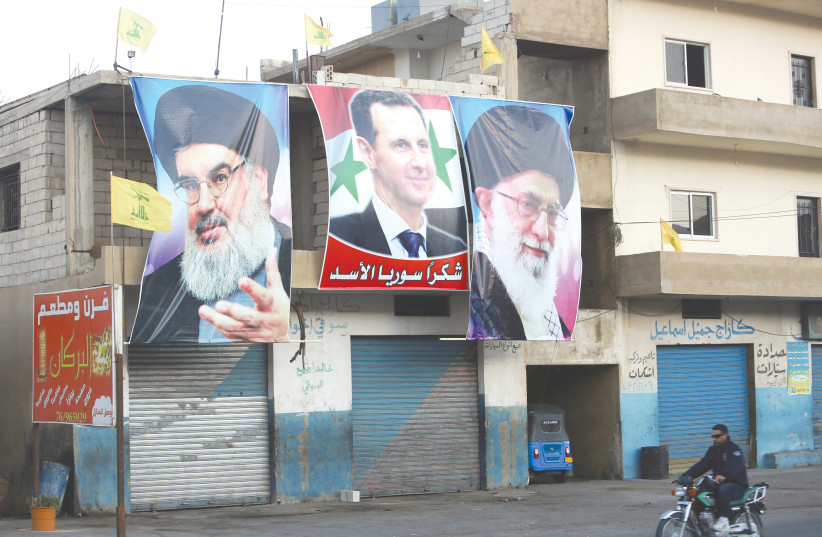A new British government-sponsored report by a London-based think tank focuses efforts on blocking the Iranian ballistic-missile threat in a way that might safeguard Western Europe and the US but leave Israel vulnerable.
“A regional process is also likely to take many years to establish, and thus would not offer immediate opportunities to negotiate missile constraints,” the International Institute for Strategic Studies said in the report.
This would leave Jerusalem exposed for the foreseeable future, though the report accurately points out that no prior efforts have stopped the Islamic Republic’s progress.
Similar ideas have been advanced in the past by other Western European and US officials.
Another key point is that, while the report posited that a return to the 2015 JCPOA nuclear deal could build trust for negotiations about ballistic missiles, the issue should be addressed as a significant and independent threat regardless of the nuclear issue.

“Iran’s missile program has long been singled out as a cause for concern both within the Middle East and beyond,” the report said. “Yet export controls, sanctions and United Nations Security Council resolutions have to date failed to halt its expansion, at least partially because these measures omitted the underlying issues driving Iran’s perceived need for missiles and related regional security dynamics.
“Without renewed diplomatic efforts to, at a very minimum, increase transparency on missile threats and reduce risks of unintended conflict or escalation, missile proliferation in the Middle East will continue to drive insecurity in the region and beyond.”
The report was sponsored by the UK’s Foreign, Commonwealth and Development Office (FCDO).
Two key findings by the report are: “1) the specific goal for negotiations must be clarified up front, and 2) engaging Iran will require taking its own security concerns into account. A carrot-and-stick method will not suffice, as a more nuanced approach is needed to reach success.”
Taking Iran’s security concerns into account turns out to be a code for requiring security concessions by both Israel and Saudi Arabia in exchange for concessions by Tehran, which leave Israel vulnerable.
For example, the report explored a scenario of Israel signaling “a willingness to discuss its own missile or WMD [weapons of mass destruction] programs, especially in the context of the Middle East WMD–FZ [free zone] (which includes related delivery systems), however unlikely it may be, that may soften Iran’s resistance to discussing its own missiles.”
The report also discusses specific weapons systems that Israel and the Saudis both might need to give up in some scenarios.
However, the report discusses Israeli and Saudi concessions within the context of keeping Iranian ballistic missiles at ranges below 3,000 kilometers, while allowing them to keep their missiles above 2,000 km.
“The existing Iranian voluntary limit not only presents a political opening, but also sidesteps many potentially difficult strategic hurdles,” the report said. “Most Iranian missiles below the 2,000-km. range have reached technological maturity and have been deployed in large numbers.”
“Any range limit below 2,000 km. would require Iran to destroy dozens of missiles that comprise a core part of its defense, and this would likely be a red line for negotiators,” it added. “A limit of 2,000 km., however, would stave off the development of missiles that could directly threaten Western Europe or the United States without compromising existing Iranian capabilities.”
Yet, Iran’s existing Shahab-3, Emad-1 and Sejjil are estimated to be able to strike up to 2,000 km. away, meaning they can easily strike Israel, the Saudis and much of Eastern Europe.
This means Israel might be asked to make concessions that could make others safer without actually making the Jewish state safer.
The report tip-toes around the issue that the Khorramshahr missile has a maximum range of 2,000 km, but with independent experts’ assessments suggesting it could reach greater distances of up to 3,000 km. if armed with a lighter warhead.
It also simultaneously addresses and then sidesteps the question of Iran’s space-launch program, which can double as intercontinental ballistic-missile tests and may already reach a range of 5,000 km.
Suggesting a flight moratorium, the report quickly determines that Iran may not agree to this and that, in place of a moratorium, the West could agree to “manage the risks that a space-launch program could contribute to the development of missiles with ranges that exceed the agreed limit.”
These risk-management measures include “prelaunch notifications for SLVs, limits on launchers and launch sites, propellant limitations and a ban on the testing of re-entry vehicles from SLVs.” But all of these measures are easily reversible and essentially reliant on ongoing Iranian goodwill.
An issue addressed in significant depth is that a deal regarding ballistic missiles could reduce how much Tehran provides such weapons to Hezbollah in Lebanon and the Houthis in Yemen.
The report also warns that besides Iran’s estimated 20 different types of 3,000 solid- and liquid-propellant ballistic missiles in service, it has at least one cruise-missile design, with others reportedly under development.
Getting the Islamic Republic to halt its cruise-missile progress is another reason that the think tank recommended initiating a new negotiating process on the issue.
